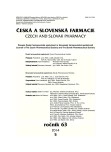-
Medical journals
- Career
Optimization of technological processes for the preparation of tablets with a low content of warfarin by direct compression
Authors: Jan Muselík; Aleš Franc; Jana Štarková; Zuzana Matějková
Authors‘ workplace: Veterinární a farmaceutická univerzita Brno, Farmaceutická fakulta, Ústav technologie léků
Published in: Čes. slov. Farm., 2014; 63, 217-221
Category: Original Articles
Overview
Warfarin is adrug with anarrow therapeutic index. It is commercially available in the form of tablets with immediate release from many generic manufacturers. Though attempts are being made to replace it with new drugs, in the U.S.A.it is still the antithrombotic agent of the first choice. In the past there were cases when after replacement of the original brand preparation with the generic one, the patient suffered from complications such as the loss of control of anticoagulation and increased frequency of patient’s visits to the physician. One of the critical parameters of tablets containing an active substance with anarrow therapeutic index (NTI) is content uniformity, which must comply with the pharmacopoeial requirements as well as the strict criteria of regulatory authorities in the validation of the manufacture of the solid dosage form. Content uniformity is affected by anumber of factors such as density, particle shape and size distribution, electrostatic charge, and concentration of the individual components. Of the technological parameters, it is mainly the intensity and length of mixing, shape of the mixing vessel and the mixer, the size of the charge, or the degree of filling of the mixing device, etc. This paper deals with the influence of the mixing time and concentration of the drug on the content uniformity of warfarin-containing tablets. In mixing the mixtures of solid substances, where the active substance is included in alow concentration, there occurs the so-called mixing-out and segregation of the active substance. For this reason it is necessary to optimize the period of mixing. This study managed to optimize the mixing time of mixtures prepared with the use of the patented technology of the Veterinary and Pharmaceutical University Brno and further to prepare tablets with varying content of warfarin (2–10 mg) from acommon blend, which fulfil the pharmacopoeial requirements as well as the requirements of regulatory authorities for content uniformity.
Keywords:
content uniformity • warfarin • blending time • narrow therapeutic index • common blend
Sources
1. Mant J. W. Pro: Warfarin should be the drug of choice for thromboprophylaxis in elderly patients with atrial fibrillation. Why warfarin should really be the drug of choice for stroke prevention in elderly patients with atrial fibrillation. Thromb. Haemost. 2008; 100, 14–15.
2. Lawren M. V., Zhanel G. Z. Clinical significance of bioequivalence and interchangeability of narrow therapeutic range drugs: focus on warfarins. J. Pharm. Pharmaceut. Sci. 1998; 3, 92–94.
3. Jaffer A., Bragg L. Practical tips for warfarin dosing and monitoring. Clev. Clin. J. Med. 2003; 70, 361–371.
4. Wittkowsky A. K. Generic warfarin: implications for patient care. Pharmacotherapy. 1997; 17, 640–643.
5. Cundiff D. K. Insufficient evidence supporting low-intensity warfarin for venous thromboembolism prophylaxis. 2003; Med. Gen. Med. 2003; 5(3), 2.
6. Warfarin sodium antitrust litigation. United states court of appeals for the third circuit. http://www2.ca3.uscourts.gov/opinarch/ 023603p.pdf (31. 7. 2014).
7. Hope K. A. Subtherapeutic INR values associated with a switch to generic warfarin. Clin. Pharmacol. Ther. 2003; 4, 215–221.
8. Swenson C., Fundak G. Observational cohort study of switching warfarin sodium products in a managed care organization. Am. J. Health. Syst. Pharm. 2000; 57, 452–455.
9. Sawoniak A. E., Shalansky A. F., Zed P. J., Sundreji R. Formulary considerations related to warfarin interchangeability. Can. J. Hosp. Pharm. 2002; 55, 215–218.
10. Franc A., Žaludek B., Goněc R. Method of producing dosage units a solid drug form containing warfarin sodium salts as active component. PLIVA-Lachema. Patent WO2005034919 (17. 10. 2003).
11. Franc A., Rabišková M., Goněc R. Impregnation: A progressive method in the production of solid dosage forms with low content of poorly soluble drugs. Eur. J. Parent. Pharm. Sci. 2011; 16, 85–93.
12. Benet L. Z., Goyan J. E. Bioequivalence and narrow therapeutic index drugs. Pharmacotherapy. 1995; 15, 433–440.
13. Franc A., Muselík J. Způsob přípravy pevné lékové formy se sodnou solí warfarinu ve formě klathrátu izopropanolu. VFU Brno. Patent CZ304136. (2. 10. 2013).
14. Muselík J., Franc A. Hodnocení obsahové stejnoměrnosti tablet s nízkým obsahem léčivé látky s úzkým terapeutickým indexem. Čes. Slov. Farm. 2012; 61, 271–275.
15. Franc A., Muselík J., Máslová R., Hadrabová J. Obsahová stejnoměrnost směsí a tablet obsahujících warfarin. Čes. slov. Farm. 2013; 62, 177–181
16. Muselík J., Franc A., Doležel P., Goněc R., Krondlová A., Lukášová I. Influence of process parameters on content uniformity of a low dose active pharmaceutical ingredient in a tablet formulation according to GMP. Acta Pharm. 2014; 64, 355–367.
Labels
Pharmacy Clinical pharmacology
Article was published inCzech and Slovak Pharmacy

2014 Issue 5-
All articles in this issue
- Lyophilisation of protein-based drugs
- Optimization of technological processes for the preparation of tablets with a low content of warfarin by direct compression
- Continuing/life-long education of pharmacists in the Czech Republic 4th cycle 2008–2011
- History of diabetes treatment in Czechoslovakia prior to 1989
- Formulation of cores for the controlled release of glucose for prevention of hypoglycemia in diabetes patients
- Preparation of feed premix for veterinary purposes
- Czech and Slovak Pharmacy
- Journal archive
- Current issue
- Online only
- About the journal
Most read in this issue- History of diabetes treatment in Czechoslovakia prior to 1989
- Lyophilisation of protein-based drugs
- Continuing/life-long education of pharmacists in the Czech Republic 4th cycle 2008–2011
- Formulation of cores for the controlled release of glucose for prevention of hypoglycemia in diabetes patients
Login#ADS_BOTTOM_SCRIPTS#Forgotten passwordEnter the email address that you registered with. We will send you instructions on how to set a new password.
- Career

